Fleurs du Mal Magazine


Or see the index
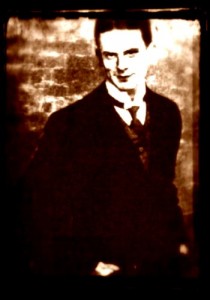
Ernst Stadler
(1883-1914)
Beata Beatrix
D. G. R.
Dämmerläuten schüttet in den veilchenblauen Abend
weiße Blütenflocken. Kleine Flocken
blank wie Muschelperlen rieseln· tanzen·
schwärmen weich wie dünne blasse Daunen·
wirbelnd· wölkend. Schwere Blütenbäume
streuen goldne Garben. Wilde Gärten
tragen mich in blaue Wundernächte·
große wilde Gärten. Tiefe Beete
schwanken brennend auf· wie Traumgewässer
still und spiegelnd. Silberkähne heben
mich von braunen Uferwiesen
in das Leuchten. Über Scharlachfluten
dunklen Mohns· der rot in Flammensäulen
züngelt· treibt der Nachen. Bleiche Lilien
tropfen schillernd drüberhin wie Wellen.
Düfte aus kristallnen Nächten tauchend·
schlingen wirr und hängen sich ins Haar·
und sie locken . . leise· leise . .
und die grünen klaren Tiefen flimmern . .
Purpurstrahlen schießen . . leise sink ich . .
süß umfängt mich müder Laut von Geigen . .
schwingt· sinkt· gleitende Paläste
funkeln fern. Licht stürzt
über mich. Weit· grün
schwebt ein Glänzen .
1904
Ernst Stadler poetry
kempis.nl poetry magazine
More in: *War Poetry Archive, - Archive Tombeau de la jeunesse, Archive S-T, Archive S-T, Stadler, Ernst
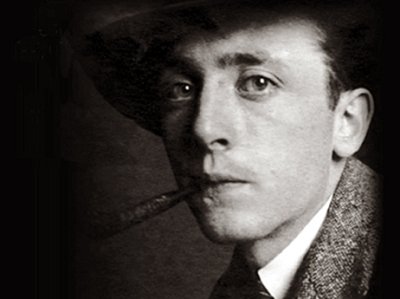
Jan Campert
(1902- 1943)
Het lied der achttien doden
Een cel is maar twee meter lang
en nauw twee meter breed,
wel kleiner nog is het stuk grond,
dat ik nu nog niet weet,
maar waar ik naamloos rusten zal,
mijn makkers bovendien,
wij waren achttien in getal,
geen zal de avond zien.
O lieflijkheid van licht en land,
van Hollands vrije kust,
eens door de vijand overmand
had ik geen uur meer rust.
Wat kan een man oprecht en trouw,
nog doen in zulk een tijd ?
Hij kust zijn kind, hij kust zijn vrouw
en strijd den ijlden strijd.
Ik wist de taak die ik begon,
een taak van moeite zwaar,
maar ‘t hart dat het niet laten kon
schuwt nimmer het gevaar;
het weet hoe eenmaal in dit land
de vrijheid werd geëerd,
voordat de vloekbre schennershand
het anders heeft begeerd.
Voordat die eeden breekt en bralt
het miss’lijk stuk bestond
en Holland’s landen binnenvalt
en brandschat zijnen grond;
voordat die aanspraak maakt op eer
en zulk Germaans gerief
ons volk dwong onder zijn beheer
en plunderde als een dief.
De Rattenvanger van Berlijn
pijpt nu zijn melodie, –
zoo waar als ik straks dood zal zijn,
de liefste niet meer zie
en niet meer breken zal het brood
en slapen mag met haar –
verwerp al wat hij biedt of bood
die sluwe vogelaar.
Gedenk die deze woorden leest
mijn makkers in den nood
en die hen nastaan ‘t allermeest
in hunnen rampspoed groot,
gelijk ook wij hebben gedacht
aan eigen land en volk –
er daagt een dag na elke nacht,
voorbij trekt iedre wolk.
Ik zie hoe ‘t eerste morgenlicht
door ‘t hooge venster draalt.
Mijn God, maak mij het sterven licht –
en zoo ik heb gefaald
gelijk een elk wel falen kan,
schenk mijn dan Uw genâ,
opdat ik heenga als een man
als ik voor de loopen sta.

Jan Campert (1902-1943): Nederlands letterkundige, journalist en dichter, werd gearresteerd wegens hulp aan joden en ter dood gebracht te Neuengamme. Toen Campert op 5 maart 1941 de Duitse bekendmaking las over de voltrokken doodvonnissen van vijftien verzetslieden van de illegale groep De Geuzen en drie stakers van de Februaristaking, schreef hij het gedicht De achttien dooden.
Bernardus IJzerdraad (49 jaar), gobelinrestaurateur
Jan Kijne (46 jaar), vertegenwoordiger
Ary Kop (40 jaar), verzekeringsagent
Jacob van der Ende (22 jaar), schilder
Leendert Keesmaat (29 jaar), onderwijzer
Hendrik Wielenga (37 jaar), electrotechnicus
Johannes Smit (30 jaar), monteur
Frans Rietveld (36 jaar), slijper
Leendert Langstraat (31 jaar), machinebankwerker
Jan Wernard van den Bergh (47 jaar), slijper
Albertus Johannes de Haas (37 jaar), metaalgieter
Reijer Bastiaan van der Borden (32 jaar), hulppolitieagent
Nicolaas Arie van der Burg (36 jaar), vertegenwoordiger
George de Boon (21 jaar), metaalbewerker
Dirk Kouvenhoven (24 jaar), stoker
E. Hellendoorn
Hermanus Mattheus Hendricus Coenradi, elektricien
J. Eyl
Jan Campert poetry
fleursdumal.nl magazine
More in: *War Poetry Archive, Archive C-D, Campert, Remco, REPRESSION OF WRITERS, JOURNALISTS & ARTISTS
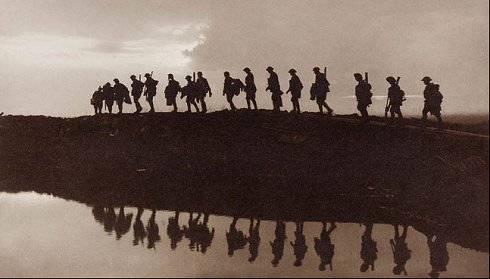
John McCrae
(1872 – 1918)
The Anxious Dead
O guns, fall silent till the dead men hear
Above their heads the legions pressing on:
(These fought their fight in time of bitter fear,
And died not knowing how the day had gone.)
O flashing muzzles, pause, and let them see
The coming dawn that streaks the sky afar;
Then let your mighty chorus witness be
To them, and Caesar, that we still make war.
Tell them, O guns, that we have heard their call,
That we have sworn, and will not turn aside,
That we will onward till we win or fall,
That we will keep the faith for which they died.
Bid them be patient, and some day, anon,
They shall feel earth enwrapt in silence deep;
Shall greet, in wonderment, the quiet dawn,
And in content may turn them to their sleep.
John McCrae poetry
kempis.nl poetry magazine
More in: Archive C-D, McCrae, John
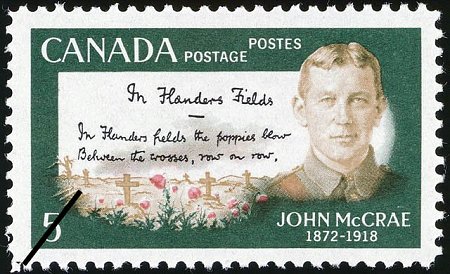
John McCrae
(1872 – 1918)
Then And Now
Beneath her window in the fragrant night
I half forget how truant years have flown
Since I looked up to see her chamber-light,
Or catch, perchance, her slender shadow thrown
Upon the casement; but the nodding leaves
Sweep lazily across the unlit pane,
And to and fro beneath the shadowy eaves,
Like restless birds, the breath of coming rain
Creeps, lilac-laden, up the village street
When all is still, as if the very trees
Were listening for the coming of her feet
That come no more; yet, lest I weep, the breeze
Sings some forgotten song of those old years
Until my heart grows far too glad for tears.
John McCrae poetry
kempis.nl poetry magazine
More in: Archive C-D, McCrae, John
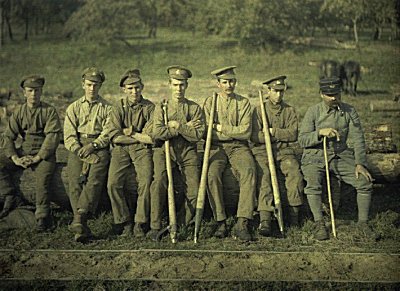
John McCrae
(1872 – 1918)
The Oldest Drama
“It fell on a day, that he went out to his father to the reapers.
And he said unto his father, My head, my head. And he said to a lad,
Carry him to his mother. And . . . he sat on her knees till noon,
and then died. And she went up, and laid him on the bed. . . .
And shut the door upon him and went out.”
Immortal story that no mother’s heart
Ev’n yet can read, nor feel the biting pain
That rent her soul! Immortal not by art
Which makes a long past sorrow sting again
Like grief of yesterday: but since it said
In simplest word the truth which all may see,
Where any mother sobs above her dead
And plays anew the silent tragedy.
John McCrae poetry
kempis.nl poetry magazine
More in: Archive C-D, McCrae, John
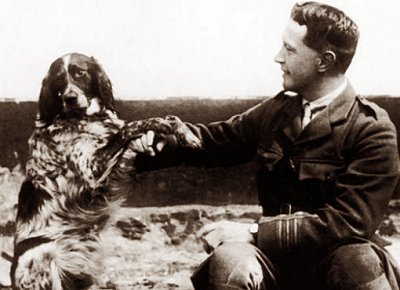
John McCrae
(1872 – 1918)
Anarchy
I saw a city filled with lust and shame,
Where men, like wolves, slunk through the grim half-light;
And sudden, in the midst of it, there came
One who spoke boldly for the cause of Right.
And speaking, fell before that brutish race
Like some poor wren that shrieking eagles tear,
While brute Dishonour, with her bloodless face
Stood by and smote his lips that moved in prayer.
“Speak not of God! In centuries that word
Hath not been uttered! Our own king are we.”
And God stretched forth his finger as He heard
And o’er it cast a thousand leagues of sea.
John McCrae poetry
kempis.nl poetry magazine
More in: Archive C-D, McCrae, John
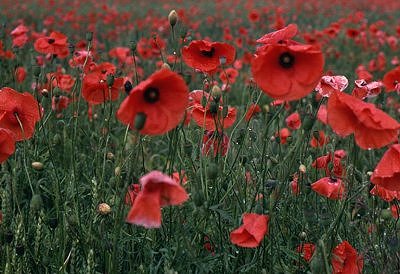
John McCrae
(1872-1918)
In Flanders fields
In Flanders fields the poppies blow
Between the crosses, row on row
That mark our place; and in the sky
The larks, still bravely singing, fly
Scarce heard amid the guns below.
We are the dead. Short days ago
We lived, felt dawn, saw sunset glow
Loved, and were loved, and now we lie
In Flanders fields.
Take up our quarrel with the foe:
To you from failing hands we throw
The torch; be yours to hold it high.
If ye break faith with us who die
We shall not sleep, though poppies grow
In Flanders fields.

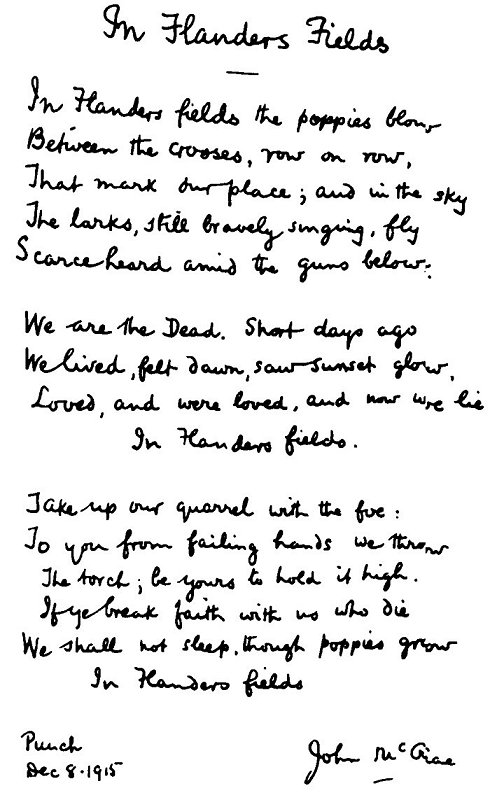
John McCrae poetry
kempis.nl poetry magazine
More in: Archive M-N, McCrae, John
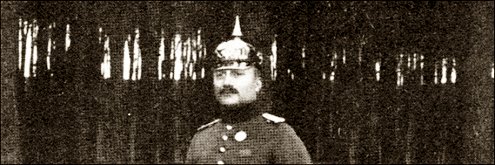
August Stramm
(1874-1915)
Krieg
Wehe wühlt
Harren starrt entsetzt
Kreißen schüttert
Bären spannt die Glieder
Die Stunde blutet
Frage hebt das Auge
Die Zeit gebärt
Erschöpfung
Jüngt
Der
Tod.
Krieggrab
Stäbe flehen kreuze Arme
Schrift zagt blasses Unbekannt
Blumen frechen
Staube schüchtern.
Flimmer
Tränet
Glast
Vergessen.
Gefallen
Der Himmel flaumt das Auge
Die Erde krallt die Hand
Die Lüfte sumsen
Weinen
Und
Schnüren
Frauenklage
Durch
Das strähne Haar.
August Stramm poetry
fleursdumal.nl magazine
More in: *War Poetry Archive, Expressionism, Stramm, August
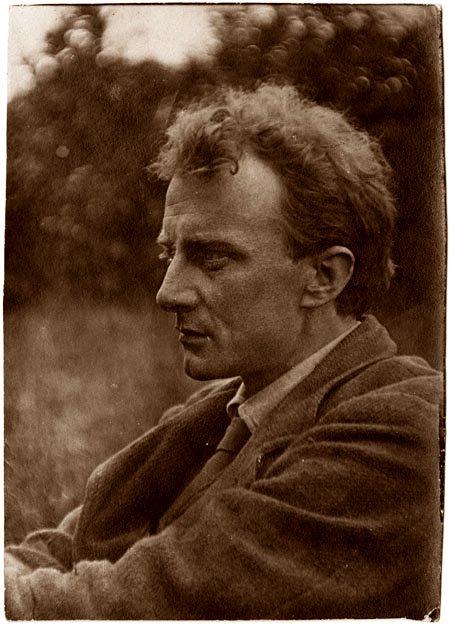
E d w a r d T h o m a s
(1878-1917)
W O R D S
That make rhymes,
Will you choose
Sometimes —
As the winds use
A crack in a wall
Or a drain,
Their joy or their pain
To whistle through —
Choose me,
You English words?
I know you:
You are light as dreams,
Tough as oak,
Precious as gold,
As poppies and corn,
Or an old cloak:
Sweet as our birds
To the ear,
As the burnet rose
In the heat
Of Midsummer:
Strange as the races
Of dead and unborn:
Strange and sweet
Equally,
And familiar,
To the eye,
As the dearest faces
That a man knows,
And as lost homes are:
But though older far
Than oldest yew, —
As our hills are, old, —
Worn new
Again and again:
Young as our streams
After rain:
And as dear
As the earth which you prove
That we love.
Make me content
With some sweetness
From Wales
Whose nightingales
Have no wings, —
From Wiltshire and Kent
And Herefordshire,
And the villages there, —
From the names, and the things
No less.
Let me sometimes dance
With you,
Or climb
Or stand perchance
In ecstasy,
Fixed and free
In a rhyme,
As poets do.
Edward Thomas: Words
k e m p i s p o e t r y m a g a z i n e
More in: Thomas, Edward
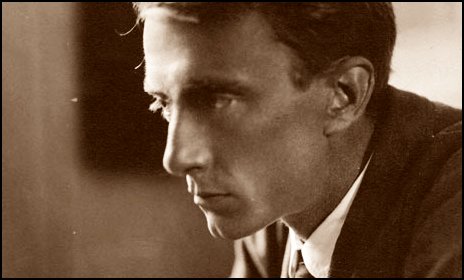
Edward Thomas
(1878-1917)
The Other
The forest ended. Glad I was
To feel the light, and hear the hum
Of bees, and smell the drying grass
And the sweet mint, because I had come
To an end of forest, and because
Here was both road and inn, the sum
Of what’s not forest. But ’twas here
They asked me if I did not pass
Yesterday this way. ‘Not you? Queer.’
‘Who then? and slept here?’ I felt fear.
I learnt his road and, ere they were
Sure I was I, left the dark wood
Behind, kestrel and woodpecker,
The inn in the sun, the happy mood
When first I tasted sunlight there.
I travelled fast, in hopes I should
Outrun that other. What to do
When caught, I planned not. I pursued
To prove the likeness, and, if true,
To watch until myself I knew.
I tried the inns that evening
Of a long gabled high-street grey,
Of courts and outskirts, travelling
And eager but a weary way,
In vain. He was not there. Nothing
Told me that ever till that day
Had one like me entered those doors,
Save once. That time I dared: ‘You may
Recall’ — but never-foamless shores
Make better friends than those dull boors.
Many and many a day like this
Aimed at the unseen moving goal
And nothing found but remedies
For all desire. These made not whole;
They sowed a new desire, a kiss
Desire’s self beyond control,
Desire of desire. And yet
Life stayed on within my soul.
One night in sheltering from the wet
I quite forgot I could forget.
A customer, then the landlady
Stared at me. With a kind of smile
They hesitated awkwardly:
Their silence gave me time for guile.
Had anyone called there like me,
I asked. It was quite plain the wile
Succeeded. For they poured out all.
And that was naught. Less than a mile
Beyond the inn, I could recall
He was like me in general.
He had pleased them, but I less.
I was more eager than before
To find him out and to confess,
To bore him and to let him bore.
I could not wait: children might guess
I had a purpose, something more
That made an answer indiscreet.
One girl’s caution made me sore,
Too indignant even to greet
That other had we chanced to meet.
I sought then in solitude.
The wind had fallen with the night; as still
The roads lay as the ploughland rude,
Dark and naked, on the hill.
Had there been ever any feud
‘Twixt earth and sky, a mighty will
Closed it: the crocketed dark trees,
A dark house, dark impossible
Cloud-towers, one star, one lamp, one peace
Held on an everlasting lease:
And all was earth’s, or all was sky’s;
No difference endured between
The two. A dog barked on a hidden rise;
A marshbird whistled high unseen;
The latest waking blackbird’s cries
Perished upon the silence keen.
The last light filled a narrow firth
Among the clouds. I stood serene,
And with a solemn quiet mirth,
An old inhabitant of earth.
Once the name I gave to hours
Like this was melancholy, when
It was not happiness and powers
Coming like exiles home again,
And weaknesses quitting their bowers,
Smiled and enjoyed, far off from men,
Moments of everlastingness.
And fortunate my search was then
While what I sought, nevertheless,
That I was seeking, I did not guess.
That time was brief: once more at inn
And upon road I sought my man
Till once amid a tap-room’s din
Loudly he asked for me, began
To speak, as if it had been a sin,
Of how I thought and dreamed and ran
After him thus, day after day:
He lived as one under a ban
For this: what had I got to say?
I said nothing. I slipped away.
And now I dare not follow after
Too close. I try to keep in sight,
Dreading his frown and worse his laughter.
I steal out of the wood to light;
I see the swift shoot from the rafter
By the inn door: ere I alight
I wait and hear the starlings wheeze
And nibble like ducks: I wait his flight.
He goes: I follow: no release
Until he ceases. Then I also shall cease.
Edward Thomas: The Other

kempis poetry magazine
More in: Thomas, Edward
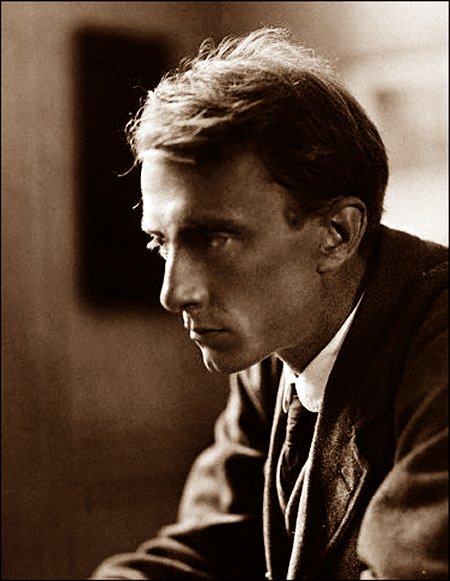
E d w a r d T h o m a s
(1878-1917)
Five Poems
A Tale
There once the walls
Of the ruined cottage stood.
The periwinkle crawls
With flowers in its hair into the wood.
In flowerless hours
Never will the bank fail,
With everlasting flowers
On fragments of blue plates, to tell the tale.
But these things also
But these things also are Spring’s —
On banks by the roadside the grass
Long-dead that is greyer now
Than all the Winter it was;
The shell of a little snail bleached
In the grass; chip of flint, and mite
Of chalk; and the small bird’s dung
In splashes of purest white:
All the white things a man mistakes
For earliest violets
Who seeks through Winter’s ruins
Something to pay Winter’s debts,
While the North blows, and starling flocks
By chattering on and on
Keep their spirits up in the mist,
And Spring’s here, Winter’s not gone.
As the team’s head-brass
As the team’s head-brass flashed out on the turn
The lovers disappeared into the wood.
I sat among the boughs of the fallen elm
That strewed the angle of the fallow, and
Watched the plough narrowing a yellow square
Of charlock. Every time the horses turned
Instead of treading me down, the ploughman leaned
Upon the handles to say or ask a word,
About the weather, next about the war.
Scraping the share he faced towards the wood,
And screwed along the furrow till the brass flashed
Once more.
The blizzard felled the elm whose crest
I sat in, by a woodpecker’s round hole,
The ploughman said. ‘When will they take it away?’
‘When the war’s over.’ So the talk began –
One minute and an interval of ten,
A minute more and the same interval.
‘Have you been out?’ ‘No.’ ‘And dont’want to, perhaps?’
‘If I could only come back again, I should.
I could spare an arm. I shouldn’t want to lose
A leg. If I should lose my head, why, so,
I should want nothing more. Have many gone
From here?’ ‘Yes.’ ‘Many lost?’ ‘Yes, a good few.
Only two teams work on the farm this year.
One of my mates is dead. The second day
In France they killed him. It was back in March,
The very night of the blizzard, too. Now if
He had stayed here we should have moved the tree.’
‘And I should not have sat here. Everything
Would have been different. For it would have been
Another world.’Ay, and a better, though
If we could see all all might seem good.’ Then
The lovers came out of the wood again:
The horses started and for the last time
I watched the clods crumble and topple over
After the ploughshare and the stumbling team.
Liberty
The last light has gone out of the world, except
This moonlight lying on the grass like frost
Beyond the brink of the tall elm’s shadow.
It is as if everything else had slept
Many an age, unforgotten and lost —
The men that were, the things done, long ago,
All I have thought; and but the moon and I
Live yet and here stand idle over a grave
Where all is buried. Both have liberty
To dream what we could do if we were free
To do some thing we had desired long,
The moon and I. There’s none less free than who
Does nothing and has nothing else to do,
Being free only for what is not to his mind,
And nothing is to his mind. If every hour
Like this one passing that I have spent among
The wiser others when I have forgot
To wonder whether I was free or not,
Were piled before me, and not lost behind,
And I could take and carry them away
I should be rich; or if I had the power
To wipe out every one and not again
Regret, I should be rich to be so poor.
And yet I still am half in love with pain,
With what is imperfect, with both tears and mirth,
With things that have an end, with life and earth,
And this moon that leaves me dark within the door.
Over the hills
Often and often it came back again
To mind, the day I passed the horizon ridge
To a new country, the path I had to find
By half-gaps that were stiles once in the hedge,
The pack of scarlet clouds running across
The harvest evening that seemed endless then
And after, and the inn where all were kind,
All were strangers. I did not know my loss
Till one day twelve months later suddenly
I leaned upon my spade and saw it all,
Though far beyond the sky-line. It became
Almost a habit through the year for me
To lean and see it and think to do the same
Again for two days and a night. Recall
Was vain: no more could the restless brook
Ever turn back and climb the waterfall
To the lake that rests and stirs not in its nook,
As in the hollow of the collar-bone
Under the mountain’s head of rush and stone.
Edward Thomas: Five Poems
kempis poetry magazine
.jpg)
More in: Thomas, Edward
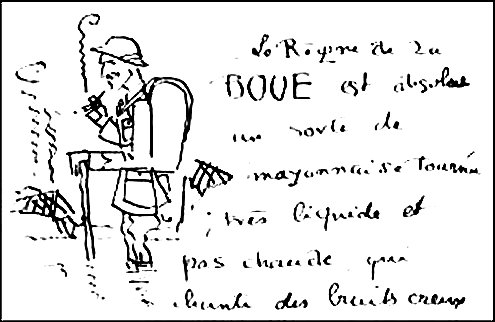
J a c q u e s V a c h é
L E T T R E S D E G U E R R E

Cher Ami,
…Je vous écris d’un ex-village, d’une très étroite étable-à-cochon tendue de couvertures — Je suis avec les soldats anglais — Ils ont avancé sur le parti ennemi beaucoup par ici — C’est très bruyant — Voilà.
…Et puis vous me demandez une définition de l’umour — comme cela ! —
« IL EST DANS L’ESSENCE DES SYMBOLES D’ÊTRE SYMBOLIQUES » m’a longtemps semblé digne d’être cela comme étant capable de contenir une foule de choses vivantes: EXEMPLE: vous savez l’horrible vie du réveillematin — c’est un monstre qui m’a toujours épouvanté à cause que le nombre de choses que ses yeux projettent, et la manière dont cet honnête me fixe lorsque je pénètre dans une chambre — pourquoi donc a-t-il tant d’umour, pourquoi donc? — Mais voilà: c’est ainsi et non autrement — Il y a beaucoup de formidable UBIQUE aussi dans l’umour — comme vous verrez — Mais ceci n’est naturellement — définitif et l’umour dérive trop d’une sensation pour ne pas être très difficilement exprimable — Je crois que c’est une sensation — J’allais presque dire un SENS — aussi — de l’inutilité théâtrale (et sans joie) de tout.
Quand on sait.
Et c’est pourquoi alors les enthousiasmes (d’abord c’est bruyant), des autres sont haïssables — car — n’est-ce pas — nous avons le génie — puisque nous savons l’UMOUR — Et tout — vous n’en aviez d’ailleurs jamais douté? nous est permis. Tout ça est bien ennuyeux, d’ailleurs.
Je joins un bonhomme — et ceci pourrait s’appeler OBSESSION — ou bien — BATAILLE DE LA SOMME ET DU RESTE — oui.
Il m’a suivi longtemps, et m’a contemplé d’innommables fois dans des trous innombrables — Je crois qu’il essaie de me mystifier un peu — J’ai beaucoup d’affection pour lui, entre autres choses.
Jacques Vaché 29 avril 1917
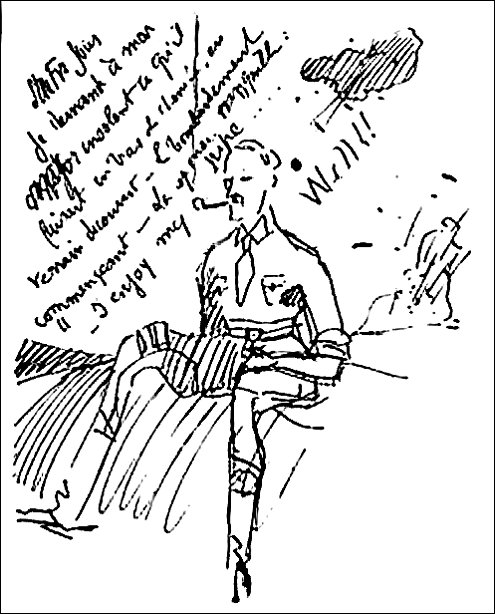
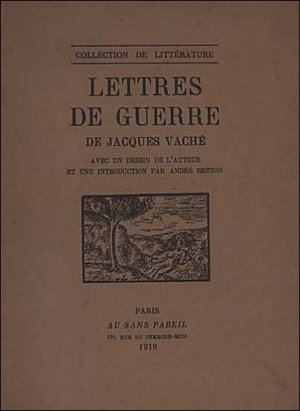


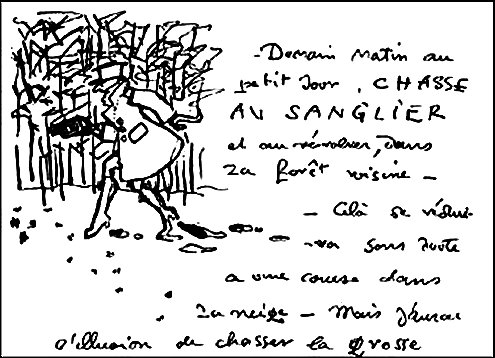

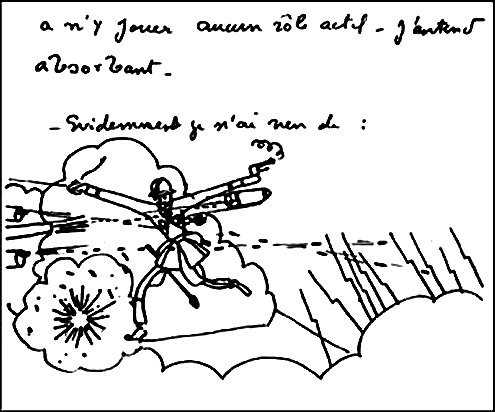
.jpg)
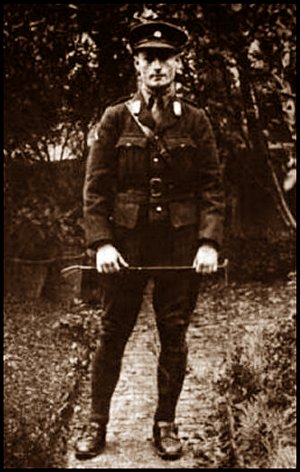
Jacques Vaché (1895-1919)
Lettres de Guerre
partie 1
fleursdumal.nl magazine
More in: *Concrete + Visual Poetry U-Z, Jacques Vaché, Vaché, Jacques, Visual & Concrete Poetry, WAR POETRY
Thank you for reading Fleurs du Mal - magazine for art & literature